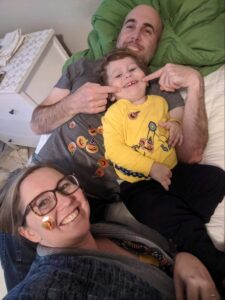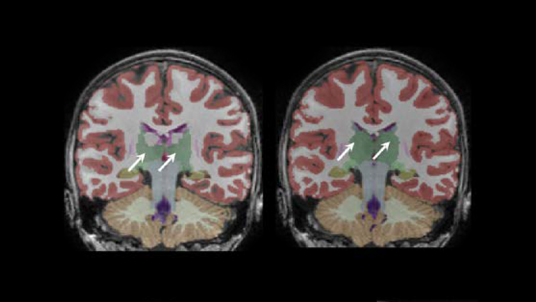By
Cortechs.ai
2 mins
Living with MS can be a journey filled with unexpected turns. Cliff Currie was recently diagnosed with relapsing-remitting Multiple Sclerosis. In this Q & A, Cliff and his wife share their experience with MS, from pre-diagnosis, to treatment, and patient empowerment. Follow along for updates on Cliff’s journey with MS.
This interview with Cliff took place in November of 2019, just over a year after his MS diagnosis. Cliff did contract work at Cortechs.ai during the time of his diagnosis, but he strongly believes that our relationship was instrumental in the discovery of his disease.

Pre-Diagnosis
Cortechs: How was your MS presenting pre-diagnosis?
Cliff: Hindsight is 20/20. I had all of the telltale signs of MS for MANY years that I wrote off as mysterious ailments that would come and go such as:
- Severe back pain
- Unexplained fatigue
- Inability to exercise and keep up with peers
- Headaches
- Issues with word and thought recall
- Inability to drive without directions
- Urinary incontinence
- Chest pain
- Blurred vision
- Heat intolerance
- Clumsiness
Andrea: Cliff has always been a very quirky guy which is why his random ailments didn’t really concern me. However, over the last 2 years his symptoms started to get concerning. I could tell he was in a whole lot of pain that no gluten-free, sugar-free diet could resolve.
Misdiagnosis
Cortechs: Many people go through a long journey to get an MS diagnosis. What did yours look like?
Cliff: When I was going through an MS relapse, I would experience an entirely new set of symptoms that would lead me to various doctors, none of which were a neurologist! Each doctor would run a battery of tests and then announce that I had one or more of the following:
- Anxiety/Depression
- Pulled muscle
- Food allergy
- Blood sugar
- Vitamin deficiency
- Urinary tract cyst
I suppose they all sounded pretty accurate at the time and who was I to second guess them?
Andrea: In the beginning, a pulled muscle and anxiety seemed like likely causes of his pain and so we just followed the doctor’s orders. Over time as Cliff and I traversed the medical world for other health issues, we became quite adept at advocating for our own health. It became pretty clear that many of the things he was diagnosed with were either incorrect or just a symptom of a larger problem.
Diagnosis
Cortechs: How were you ultimately diagnosed with MS and How did you feel after being diagnosed?
Cliff: Andrea’s run-in with breast cancer and subsequent issues with auto-immune diseases taught us how to become our own advocates which ultimately helped get me diagnosed.
I am lucky that the imaging center I went to utilized NeuroQuant MS by Cortechs so that we could get a detailed image and analysis of lesions. Having the most accurate scan helped my doctors and I truly see what we were dealing with, and it gave me the confidence to accept my diagnosis much faster than if we didn’t have a clear picture. That being said, I still felt incredibly shocked and we had a TON of questions. Will I be disabled? Will my son get MS? Will I get to ride my bike ever again? Will I need constant care? Will the cost of medicine put us in debt?
Andrea: I don’t want to take credit for Cliff finally getting diagnosed with MS, but I put all of the pieces together and demanded he see a neurologist and get an MRI. How did I feel about it? Pure devastation with a dash of relief. Knowing what to call this monster was relieving, but looking into the future was terrifying. We had so many questions and not a lot of good answers. Luckily we have an amazing family and circle of friends who swooped in to care for us as we dug into planning Cliff’s treatment.
Treatment
Cortechs: How did you decide on your treatment?
Cliff: First and foremost, I wanted to make sure I was under the care of the best MS doctors. With their guidance and a whole lot of sleepless nights, we narrowed it down to two pharma options – Lemtrada and Ocrevus.
Andrea: SO MUCH RESEARCH! We attempted to really dig into the grey areas of the disease and find some clarity, so that we could make informed decisions. We made sure that Cliff’s MRI’s were done with the best technology available, to ensure accuracy, and that’s how we found Cortechs.ai, who provides the best analysis and tracking of lesions. We talked to anyone and everyone who is involved in MS treatment, research and diagnostics. While a huge part of us wanted to hope a good diet and exercise would stave off disability, we knew that pumping the brakes would only be possible with disease-modifying therapy. We landed on Ocrevus because of the reviews, research and minimal risks compared to Lemtrada.
Patient Empowerment
Cortechs: What do you do to remain hopeful and active in the MS Community?
Cliff: We are absolutely blown away by the incredible MS community where we live. We have regular meetings and we also recently participated in the Walk for MS. It seems that over the last few years MS patients are getting more access to innovative medicines and diagnostic tools that were completely inaccessible. Simply knowing that I can go into my local imaging center and get a scan with NeuroQuant MS, that gives us a clear picture of my disease and is driven off of artificial intelligence, makes me feel empowered and in control of my journey with MS.
Andrea: I have to say I’m incredibly impressed by the way doctors, researchers, diagnostic and drug companies are wrapping their arms around better ways to diagnose, treat and ultimately cure MS. This has given us an incredible amount of hope for Cliff and for others struggling with MS. Additionally, I recommend that anyone with MS in their lives should get involved with the National MS Society as well as listen to Real Talk MS by Jon Strum.
Thank you, Cliff and Andrea, for sharing your story! We are grateful to them for their transparency, and for shedding light on the importance of early diagnosis and becoming one’s own advocate.
NeuroQuant MS
At Cortechs.ai, we are dedicated to supporting those affected by multiple sclerosis.
NeuroQuant MS offers accurate visualization of lesions and lesion volume change to deliver a precise and objective assessment of disease progression. Obtaining volumetric qualification of lesions can facilitate the early detection and monitoring of MS, thus allowing for earlier interventions and reducing long-term MS-related disability.
We take pride in contributing to the fight against MS, and we want to show our support for those living with the disease and raise awareness about the need for better care and treatment options.
To learn more about NeuroQuant MS, please visit the page or check out our other blog posts.
Share


